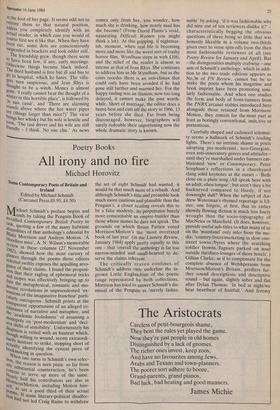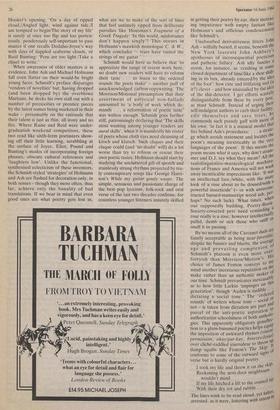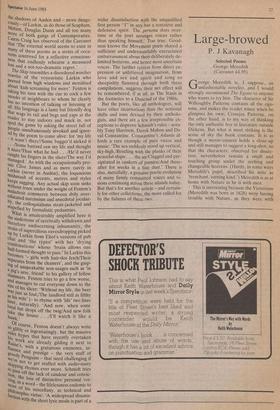Poetry Books
All irony and no fire
Michael Horovitz
Some Contemporary Poets of Britain and Ireland Edited by Michael Schmidt (Carcanet Press £9.95, £4.50) Michael Schmidt's preface begins and ends by taking the Penguin Book of so-called Contemporary British Poetry to task, quoting a few of the many hubristic absurdities of that anthology's editorial by 13, bloodless Morrison and Andrew Motion. `A "'oodless miss', A. N. Wilson's memorable review in these columns (27 November 19$2), showed how the most cursory of 'Lances through the poems those editors selected swiftly exposes the appalling arro- gance of their claims. I found the proposi- tion that their ragbag of ephemeral tricks adndte a tropes was effectiely bringing up to _, the metaphysical, v romantic and mo- revolutions in unprecedented 'ex- tensions of the imaginative franchise' parti- tularly outrageous. Schmidt points at the _tansparent opportunism of an alleged re- n.‘aissance of narrative and metaphor, and the 'academic foolishness' of assuming a s.ntl°Poly on 'post-modernism' and `deci- (lye shifts of sensibility'. Unfortunately his dlesPision is veiled with an hauteur which, n ough willing to wound, seems extraordi- a:rilY hesitant to strike, stopping short of botnallY identifying the cynical piece of
.1,,:i‘linaking in question.
tiow hen one turns to Schmidt's own selec- an n' the reason is seen plain: so far from e`,Y substantial counteraction, he's been Nentent to serve up more of the same. 4 early half his contributors are also in seicifilis°n/Motion, including Motion him- po ' as are a good third of their actual tioe„in,s. If some literary-political disaffec- " nad not led Craig Raine to withdraw the set of eight Schmidt had wanted, it would be that much more of a rehash. And although Schmidt's title and preamble look much more cautious and plausible than the Penguin's, a closer reading reveals this to be a false modesty, its perpetrator barely more conscionable an empire-builder than those whose names he dare not speak. The grounds on which Brian Patten voted Morrison/Motion's the 'most overrated book of last year' (in the Literary Review, January 1984) apply pretty equally to this one — that 'overall the anthology is far too narrow-minded and small-hearted to de- serve the claims inherent.'
The critically craven confines of Schmidt's address only underline the in- grown Little Englandism of the poetic range represented by both collections. Morrison has tried to answer Schmidt's dis- missal of the Penguin as 'merely fashio- nable' by asking, 'if it was fashionable why did nine out of ten reviewers dislike it?' characteristically begging the obvious questions of there being so little that was honestly likeable in a volume two-thirds given over to verse spin-offs from the then most fashionable reviewers of all (see Poetry Review for January and April). But — the disingenuities multiply crabwise — one aim of Schmidt's anthology, which in addi- tion to the two trade editions appears as No.36 of PN Review, cannot but be to make the poets whom his magazine and book imprint have been promoting simi- larly fashionable. And when one studies the form and body of front-runners from the PNR/Carcanet stables introduced here alongside those retained from Morrison/ Motion, they remain for the most part at least as boringly conventional, imitz.tive or pretentious.
Carefully shaped and cadenced solemni- ty seems a hallmark of Schmidt's leading lights. There's no intrinsic shame in poets adopting pre-modernist, neo-Georgian, even anti-innovatory genres and attitudes until they're marshalled under banners em- blazoned 'new' or Contemporary. Peter Scupham's reflections in a churchyard clang solid keynotes at the outset — 'Bells close on a plain song./All speak here with an adult, eheu tongue'; but aren't they a bit hackneyed compared to Hardy, if not downright dull? When the subject of An- drew Waterman's rhymed reportage is Ul- ster, one forgets, at first, that its rather showily flowing diction is much less finely wrought than the socio-topography of MacNeice or Masefield. (It does, however, provide useful sub-titles to what many of us on the 'mainland' only infer from the me- dia: 'country-livers/marketing in slow one- street towns;/byres where the searching soldier frowns./Jaguars parked on mud outside the/disco-lounges of shore hotels'.) Gillian Clarke, as if to compensate for the complete absence of Welshpersons from Morrison/Motion's Britain, proffers fur- ther sound descriptions and descriptive sound — but again, slightly sober and flat after Dylan Thomas: 'In bed at night/we hear heartbeat of fruitfall.' And Jeremy
Hooker's opening, 'On a day of ripped cloud,/Angled light, wind against tide,/ am tempted to begin/The story of my life' is surely at once too flip and too porten- tously, ponderously self-important to pass muster if one recalls Dedalus-Joyce's way with days of dappled seaborne clouds, or Basil Bunting: 'Pens are too light./Take a chisel to write.'
When awareness of older masters is in evidence, John Ash and Michael Hofmann fall even flatter on their would-be bright young faces. Schmidt's preface disparages `vendors of novelties' but, having dropped (and been dropped by) the overblown Martians, he decks his own stall out with a number of preciocities or prentice pieces by the latest names being marketed in their wake — presumably on the rationale that their talent is just as thin, all irony and no fire. Where Raine and Reid were under- graduatish weekend competitors, these two read like sixth-form poetasters show- ing off their little learning, scrabbling at the surface of Joyce, Eliot, Pound and Bunting's modes of incorporating foreign phrases, obscure cultural references and laughters low'. Unlike the functional, synthesised eclecticism of these inventors, the Schmidt-styled 'strategies' of Hofmann and Ash are flashed for decoration only, in both senses — though they more often, thus far, achieve only the banality of bad translations. If we bear in mind that even good ones are what poetry gets lost in, what are we to make of the sort of lines that feel untimely ripped from deliberate parodies like Housman's Fragment of a Greek Tragedy: 'In this world, misfortunes don't happen singly'? This occurs in Hofmann's mawkish monologue C. & W.,
which concludes tears have rusted the strings of my guitar.'
Schmidt would have us believe that `to appreciate the range of recent work here, no doubt new readers will have to reform their taste . . . to listen to the ordered sounds the poets make' — another puff of unacknowledged carbon-copywriting. The Morrison/Motional presumption that their assortment of unlyrical non-ballads amounted to 'a body of work which de- mands . . . a reformation of poetic taste' was witless enough. Schmidt goes further still, patronisingly declaring that 'The skills most wanting among younger readers are aural skills', when it is manifestly his roster of poets whose cloth ears need cleansing of kitsch and klatsch. Such cliques and their claque could (and `no doubt' will) do a lot worse than try to reform or rescue their own poetic tastes. Hofmann should start by studying the uncluttered gift of speech and stainlessly strung rhythms projected by tru- ly contemporary songs like George Harri- son's While my guitar gently weeps. The simple, sensuous and passionate charge of the best pop lyricism, folk-rock and oral verse of the last two decades confirms, for countless younger listeners innately skilled in getting their poetry by ear, their increas- ing impatience with empty fustian like Hofmann's and officious condescension like Schmidt's.
Unabsorbed derivativeness litters John Ash — wilfully buried, it seems, beneath the New York laureate John Ashbery's apotheoses of inconsequential poeticism and pathetic fallacy. Ash idly fancies a storm, for instance, as 'crashing in some closed department of time/like a shoe shift- ing in its box, already entered/by the idea of the foot': how cute and titillating and (is it?) clever — and how unassailed by the idea of the shit-detector. I get efforts scarcely distinguishable from these by e as must Schmidt. Instead of uervginryg Ptil°csit; self-indulgent authors to curb their facility, edit themselves and save trees, he, commends such pseudy guff with more of his own: 'in fact it is a musical model that lies behind Ash's procedures: . . . a strate- gy which avoids statement and locates the poem's meaning inextricably in the very languages of the poem'. If this means the poem means what it says, why don't strum- mer and D.J. say what they mean? All the tautolinguistico-muzacological machina' tions of France and America will not was away inextricable imprecisions like: 'It was an intellectual face,/white, with the mute look of a rose about to be doused/with a powerful insecticide' (— or with unrecons. tructed burned-manuscript wood ash, Per- haps? No such luck). What times, whenour supposedly budding, Poetry-130°. Society-cosseted pets need reminding ? rose really is a rose, however intellectually pallid, dumb or sick those who sniff °r snuff it in passing. By no means all of the Carcanet duds are faintly acceptable as being near-juvenilia; despite his banner and blurbs, the average, age and prevailing complexion °1 Schmidt's platoon is even more over: fortyish than Morrison/Motion's. Ws choice of James Fenton conveys to tneY mind another incestuous reputation on di, make rather than an authentic maker ?' our time. Schmidt prevaricates inexcusably as to how little Larkin 'impinges on tilts generation', though 'Auden is audible . ; dictating a social tone.' The 'ordereu sounds' of writers whose tone — social or , not — is taken from dictation are part and parcel of the anti-poetic aspiration tu authoritarian schoolsiness of both antholo gies. This apparently obligatory genutlec- . tion to a glum-bummed poetics helps equiPi the imposition of awkward rhymes (vision, permission, okaylpar-kay, breezeslJesus) over elichd-raddled journalese to throw 114 damp squibs like Fenton's The Skip. conforms to some of the outward signs of verse but is hardly original poetry. I took my life and threw it on the skill, Reckoning the next-door neighbours wouldn't mind If my life hitched a lift to the council tiP With their dry rot and rubble . • •
The lines wink to be read aloud, yet fait arrested, as it were, loitering with intent
the shadows of Auden and — more dange- rously — of Larkin, as do those of Scupham, Motion, Douglas Dunn and all too many more of both gangs of Contemporaries. Cairns Craig has observed of the Carcanet that 'The external world seems to exist in many of these poems as a series of occa- - sions contrived for a reflective conscious- ness that endlessly rehearse a measured loss and a not-too-dramatic regret.'
The Skip resembles a disordered wordier rewrite of the voyeuristic Larkin who Peered from high windows and moralised about 'kids screaming for more'. Fenton is taking his turn with the cue to cock a few snooks at neighbours to whom he clearly has no intention of talking or listening at all. His language is a lame but friendly dog that wags its tail and begs and yaps at the reader to stay indoors and muck in, not spoil the game by asking the street full of People simultaneously invoked and ignor- ed by the poem to come alive: for 'my life — it wasn't there!/Some bugger'd nicked it
• ./Some bastard saw my life and thought it nicer/Than what he had . . ./He'd never caught his fingers in the slicer/The way I'd managed.' As with the occupationally pro- saic Clive James and as more rarely in Larkin (never in Auden), the loquacious Mishmash of accents, metres and styles keeps sagging. Any actual skip soon sinks without trace under the weight of Fenton's Maladroit commerce between drily over- educated narcissism and anecdotal jocular- ity, the colloquialisms strait-jacketed and stupefied by formalistic pedantries. What is amateurishly amplified here is the undertone of cerebrally withdrawn and therefore undiscerning inhumanity, the strain of supercilious eavesdropping picked arl by Larkin from Eliot's versions of pub chat and 'the typist' with her 'drying combinations' whose 'brain allows one .half-formed thought to pass.' In Larkin this becomes girls with hair-dos fetch/Their separates from the cleaners', and the gasp- ing of unspeakable non-usages such as 'in a Pig's arse, friend' to his gallery of fellow slummers. Fenton tries to go a few worse, and manages to cut everyone down to the Size of his slicer: 'Without my life, the beer Was just as foul,/The landlord still as filthy as his wife' (— to rhyme with 'life' two lines later, naturally). 'And now, when some local bat drops off the twig/And new folk hat, ke the house . watch it like a _ Of course, Fenton doesn't always write :oal glibly or ingratiatingly, but the massive b: es bYPes that have recently overtaken '5. work are already gilding it next to fl aloe's, with a gratuitous eminence, in- :lence and prestige — the very stuff of weedy Penguins — that need challenging if ski re not to get stuffed with audio-nasty t,_,IPPing rhymes ever more. Schmidt tries .LPass off the lack of candour and convic- tion, the loss of distinctive personal voi- inuog, in a word — the lifelessness endemic to Mist of his miscellany, as technical and faL.dsophic virtue: 'A widespread dissatis- faction with the short lyric mode is part of a
wider dissatisfaction with the unqualified first person "1" in any but a tentative and defensive spirit. The persona does over- time or the poet arranges voices rather than speaking himself.' Too true. Good- ness knows the Movement poets shared a sufficient and understandably excruciated embarrassment about their deliberately de- limited horizons, and hence most uncertain voices. The further retreat from direct ex- pression or unfettered imagination, from love and sex and spirit and song so sheepishly flaunted through both these compilations, suggests their net effect will be remembered, if at all, as The Stasis in the footnotes to a Dunciad of the 1980s.
But the poets, like all anthologees, will have other incarnations than the notional shifts and isms devised by their antholo- gists, and there are a few irrepressible ex- ceptions to disprove Schmidt's rules — nota- bly Tony Harrison, Derek Mahon and Da- vid Constantine. Constantine's Atlantis af- fords a rare example of pure vision and music: 'The sea suddenly stood up vertical, sky-high,/Bristling with the planks of their peaceful ships/. . . the air/Clagged and pre- cipitated in cankers of pumice/And there- after for weeks in a fine dust.' There is also, mercifully, a genuine poetic evolution of many firmly committed voices and vi- sions continuing across these islands today. But that's for another article — and certain- ly for other collections, the more called for by the failures of these two.














































 Previous page
Previous page